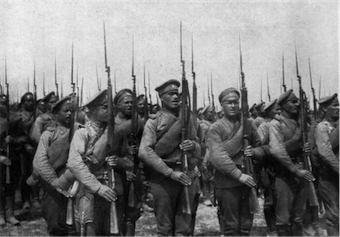

|
Patriotic Hopes  Russian infantry The Tsar's declaration of war on 31 July 1914 was met by an outpouring of national unity. Workers' strikes came to a halt. Socialists united behind the defence of the Fatherland. The Duma dissolved itself, declaring on 8 August that it did not want to burden the government with 'unnecessary politics' during the war. Patriotic demonstrators attacked German shops and offices. They ransacked the German Embassy. Afraid of the revolutionary potential of this xenophobia, the government changed the German-sounding name of St Petersburg to the more Slavonic Petrograd. The Russian army was at least the equal of the German in manpower and material. Thanks to improvements in Russia's western railways, it took only three days more than its enemy to complete the mobilization of its 1.2 million men. The Schlieffen Plan (which had counted on the Russians taking three weeks longer so that Germany could not knock out France before Russia attacked them) was thus confounded and the Germans were bogged down in fighting on two Fronts. Under pressure from the French, the Russians attacked the Germans in East Prussia to force them to withdraw troops from the Western Front. A bold attack by Generals von Rennenkampf and Samsonov forced the Germans back, but the latter were able to regroup their forces further south and destroy Samsonov's army in the battle of Tannenberg. Moving their troops north again by rail, the Germans then defeated the Russians in the Battle of the Masurian Lakes (9-14 September), forcing von Rennenkampf to order a retreat. The Germans joked that the Russian general should be renamed 'Rennen vom Kampf' ('flight from battle'). |
© 2014 Orlando Figes | All Rights Reserved